A pounding headache, constant pressure on your forehead and thick, coloured mucus; these are just some of the symptoms that could point towards sinusitis, or also known as sinusitis. You might already be experiencing these symptoms right now.
Unfortunately, it may be hard for you to rule out what you really have. There are some illnesses like the common cold that shares the same symptoms as sinusitis.
In this complete guide to sinusitis, I will be going through with you in-depth what sinusitis are; covering what it is, the causes, the different types of sinusitis, when you should seek help and more.
Read on to find out!
Sinusitis: what is it?
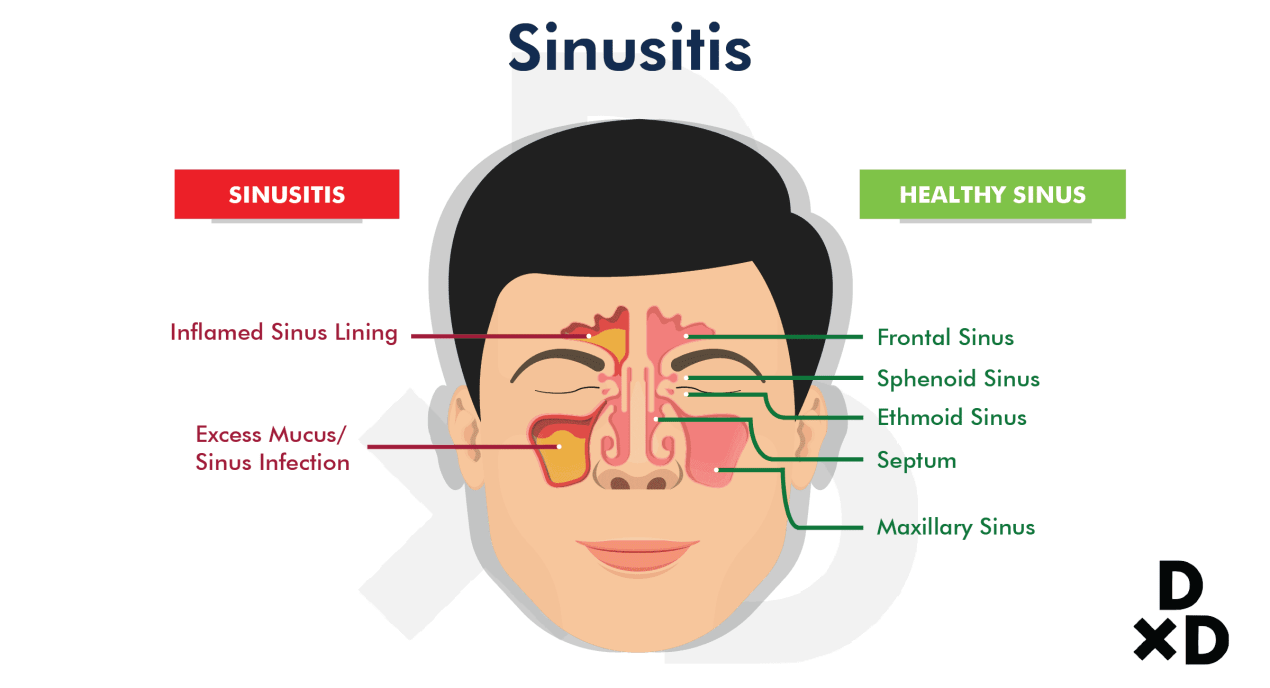
Sinuses are air-filled cavities located in your skull. The lining of these cavities produces mucus that drains into your nose. The 4 major pairs of sinuses are [1]:
- Maxillary sinus. Also known as the “cheek sinus” as it is located below your eyes.
- Frontal sinus. It is located above your eyes - in the forehead.
- Ethmoid sinus. It is located in between your eyes.
- Sphenoid sinus. It is located behind your eyes.
Everyone has sinuses. I do get patients who will often tell me that they have “sinus”. We don’t know why we have sinuses. However, we do know some of their functions. They help to:
- Warm and moisten the air that you breathe in
- Produce mucus that helps to filter the air from dirt and bacteria
- Shape the quality of your voice
- Reduce the weight of your head
When someone complains of having “sinus”, it is likely that they are referring to “rhinitis”. It is an inflammation of the nasal cavity. To find out more about rhinitis, do read my previous article on Human here.
Sinusitis, on the other hand, refers to inflammation or infection of the sinuses.
What are the different types of sinusitis and what can cause them?
The different types of sinusitis.
Sinusitis are arranged by their duration. To list, there are two different types of sinusitis [2][3]:
- Acute. They last for less than 3 months
- Chronic. They last for more than 3 months
What causes them?
We are not sure why some people are more prone to getting this infection. However, we do know of some factors that play a role. These factors are:
- Uncontrolled nasal allergies
- Structural abnormalities in the nose
- Genetics
- Immunity
Is sinusitis contagious?
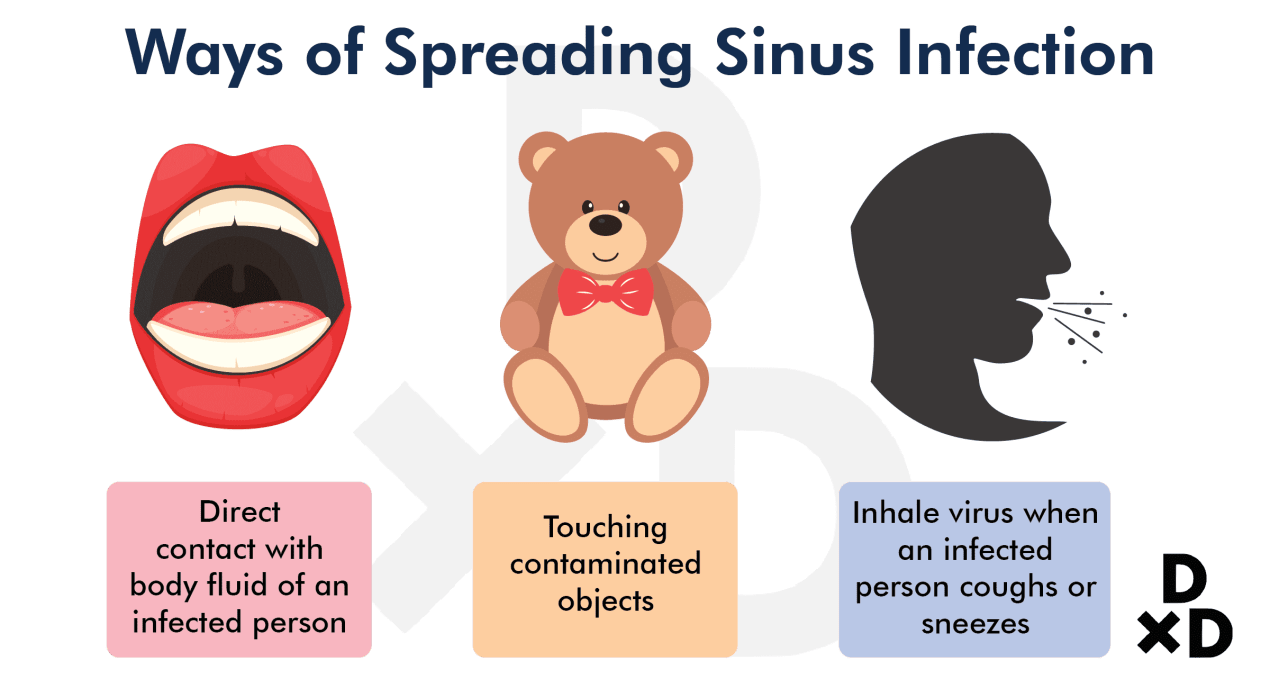
Sinusitis is caused by:
- viruses,
- bacteria and
- fungus.
Bacterial and fungal sinusitis is not contagious whereas virus sinusitis is. Here are the few ways the virus can be spread:
- Having direct contact with the body fluid of an infected person (e.g. mucus, saliva)
- Touching contaminated objects (e.g. doorknobs, toys)
- Inhaling virus-laden aerosols (e.g. when an infected person coughs or sneezes)
What are the most common symptoms of sinusitis?
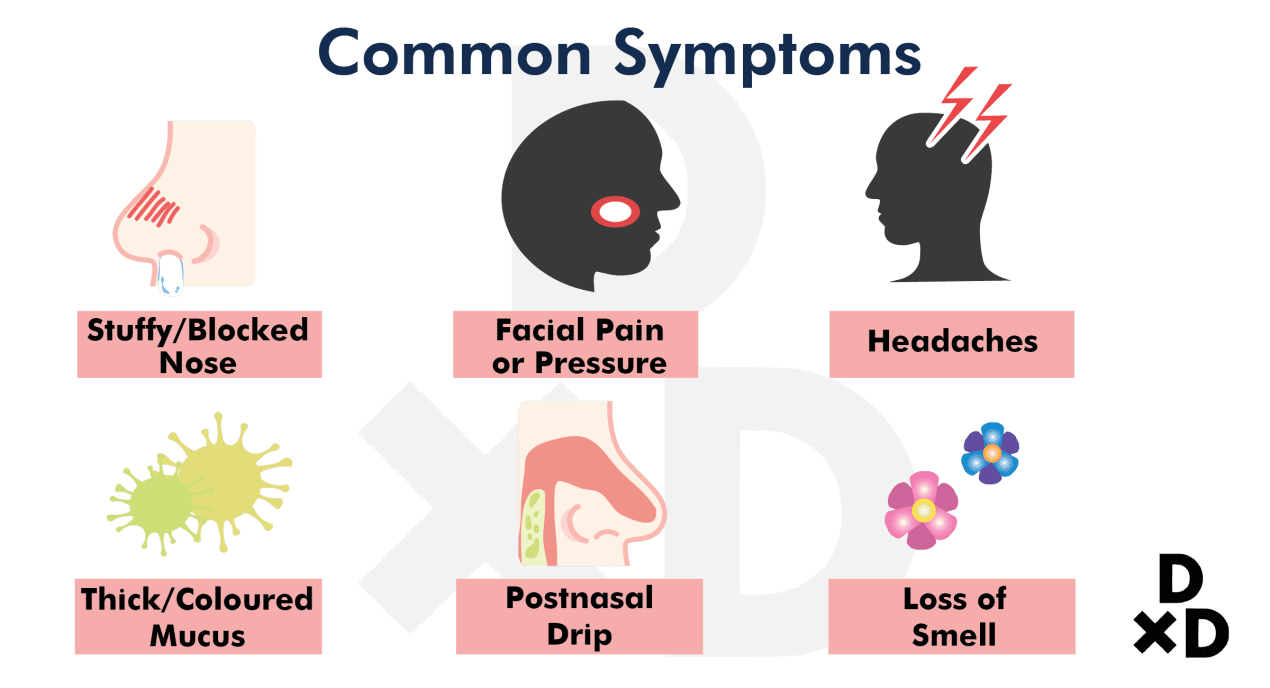
The common symptoms are [4]:
- stuffy or blocked nose
- facial pain or pressure
- headaches
- thick or coloured mucus/phlegm
- postnasal drip
- loss of smell
How is sinusitis diagnosed?
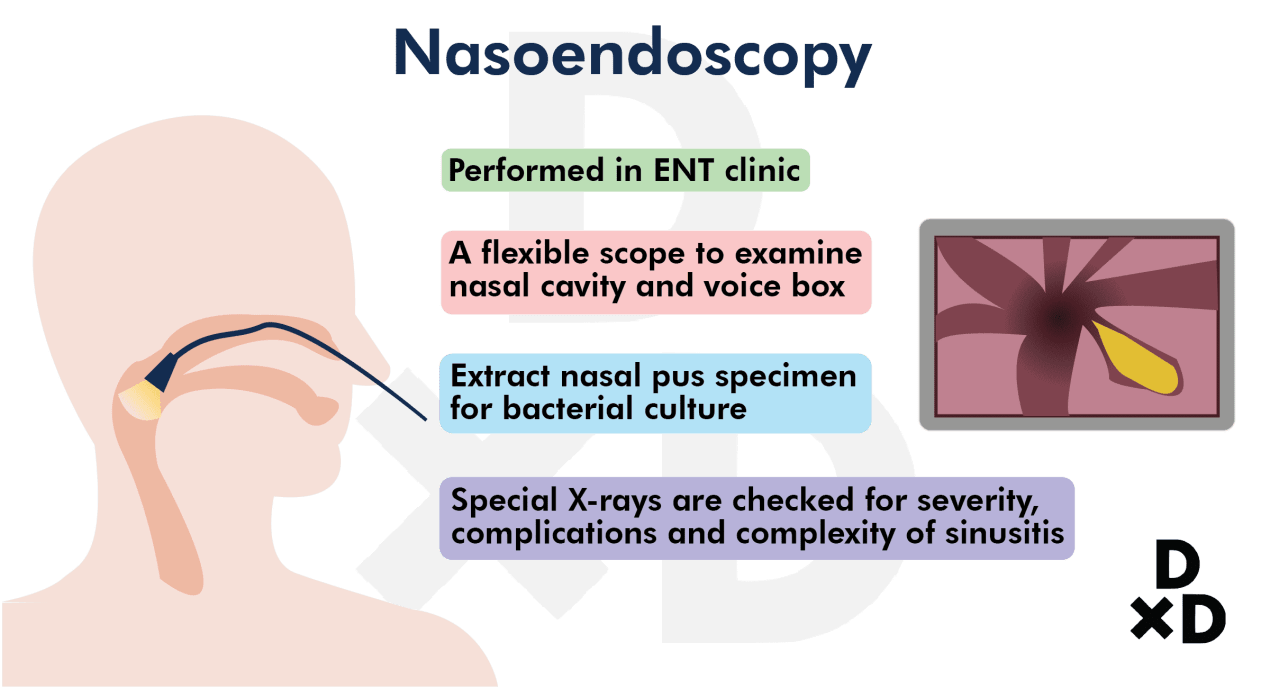
Sinusitis is based on the suggestive symptoms as well as on the findings of a nasoendoscopy. In fact, nasoendoscopy is a simple and painless procedure. It is performed in ENT clinics under local anaesthesia and can take less than 3 minutes to complete. It involves the passage of a flexible scope (a lighted tube attached to a camera system) to pass through the nasal cavity and down to the level of the voice box.
A swab of pus from the nose may be taken and sent to the laboratory for bacterial culture. This helps to determine which type of antibiotics will be effective against the bacteria. In addition, a CT scan of the sinuses may be involved. A series of special X-rays would be taken to determine:
- the severity,
- complications and
- the complexity of sinusitis.
How can I treat sinusitis?

To list, sinusitis can be treated with the use of [5]:
- antibiotics
- sinus rinse
- nasal steroid sprays
- mucus thinners
- decongestants
- pain relievers
Most acute sinusitis can be treated within 7-14 days. However, some acute sinusitis may last longer. When the infection lasts longer than 3 months, it is known as a chronic infection. Its treatment is more complex and may require surgical intervention.
Do I have to take antibiotics to treat sinusitis?
The symptoms of viral or bacterial sinusitis in its early stages is similar to a common cold/flu. Thus, it can be hard for a doctor to distinguish between the two.
Furthermore, a viral cold/flu can present itself with many of the symptoms like bacterial sinusitis. Hence, it can result in:
- sore throat,
- body aches and
- fever.
Studies have shown that viral or bacterial sinusitis can resolve by themselves within 7-10 days. Hence, antibiotics are usually not prescribed if your symptoms last less than 7-10 days or get better in 3-5 days.
What can I do to prevent sinusitis?
Controlling your nasal allergies and building up your immunity may help to prevent this repeated sinusitis. On the other hand, nasal and sinus surgeries may be recommended if you have abnormal or complex structures in your nose and sinuses. An example of an abnormal structure in the nose and sinuses is a deviated nasal septum.
What are the differences between sinusitis and other illnesses?
Common cold
A cold and sinusitis are similar in their symptoms. However, a cold occurs when there is a viral infection in the nasal cavity. Meanwhile, sinusitis occurs when the sinuses are inflamed or infected.
The common symptoms between a cold and sinusitis are:
- Blocked nose
- Coloured or thick nasal mucus/phlegm
- Postnasal drip
- Cough
However, when you have a cold, you may also experience:
- Sneezing
- Fever
- Body ache
- Sore throat
Whereas if you have sinusitis, you would get:
- Facial pain or pressure
- Lack of smell
A cold can be resolved within a week, whereas acute sinusitis tends to last 7-14 days.
Rhinitis
Sinusitis is the inflammation or infection of the sinuses whereas rhinitis is the inflammation of the nasal cavity. The symptoms between the two are also similar, however, they vary a bit. For instance, the symptoms of rhinitis are as follows:
- blocked nose
- clear runny nose
- sneezing
- postnasal drip
- cough
- itchy nose and eyes
However, rhinitis can be split into two types, allergic and non-allergic.
Here are the factors that contribute to allergic rhinitis [6]:
- the inhalation of house dust mites
- cat or dog fur
- pollen
- mould
Meanwhile, factors that contribute to non-allergic rhinitis include [7]:
- change of temperature
- cigarette smoke
- perfume
- hormonal changes
Unlike sinusitis, allergic rhinitis is not an infection. To list, the treatment involves:
- allergen avoidance,
- nasal steroid sprays,
- antihistamines and
- decongestants.
For patients who have nasal allergy with a positive test (through a blood test), they can consider going through immunotherapy. It involves a daily application of the known allergen by taking it under the tongue for a period of 3-5 years. It is also known as SLIT or Sublingual Immunotherapy [8].
Generally, SLIT works by exposing your body to low dosages of the allergen daily. Over time, your immunity builds and thus, gets stronger. However, this is the only known cure for allergic rhinitis.
For more info, refer to my article here.
ASK DR GAN A QUESTION ABOUT SINUSITIS
What is chronic sinusitis?
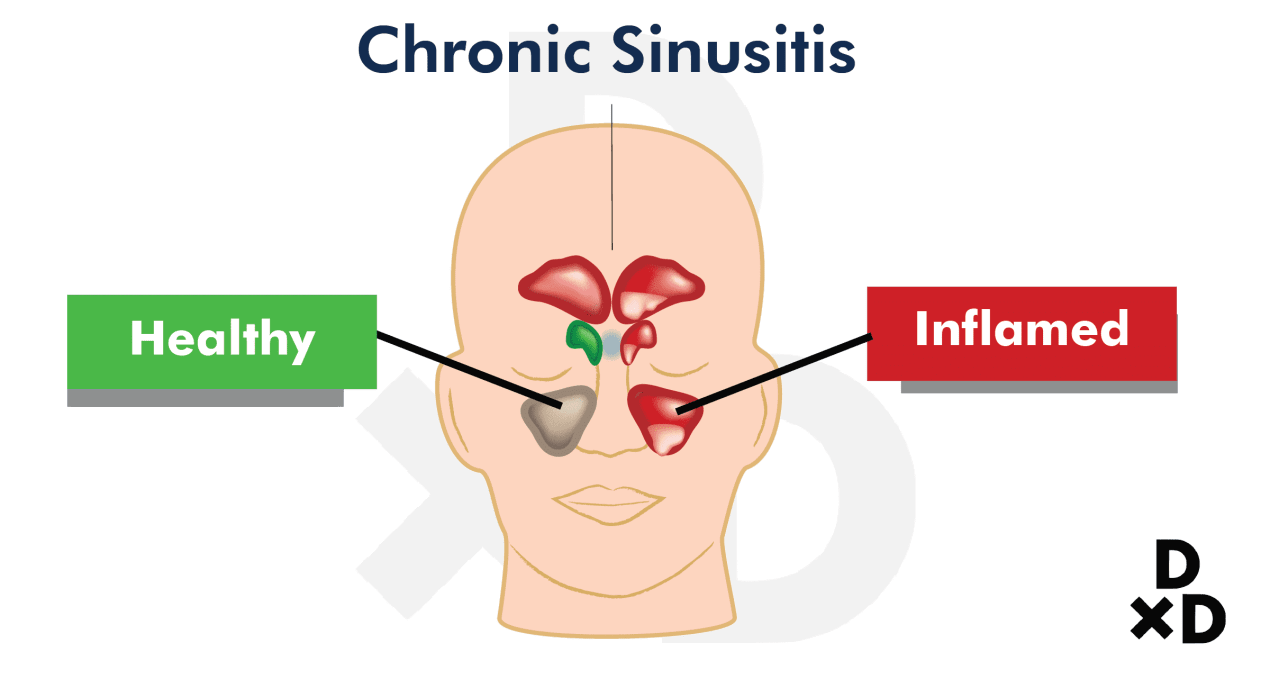
Chronic sinusitis refers to the inflammation or infection of the sinuses that lasts longer than 3 months.
Similarly, it is split into two chronic sinusitis [9]:
- with nasal polyposis (CRSwNP)
- and without nasal polyposis (CRSsNP).
Nasal polyps are the outpouching from the lining of the nose and sinuses. The reason for their appearance is unknown. It also has several risk factors which include:
- nasal allergies
- chronic bacterial infection
- poor immunity
- genetics
Is there a permanent treatment for chronic sinusitis?
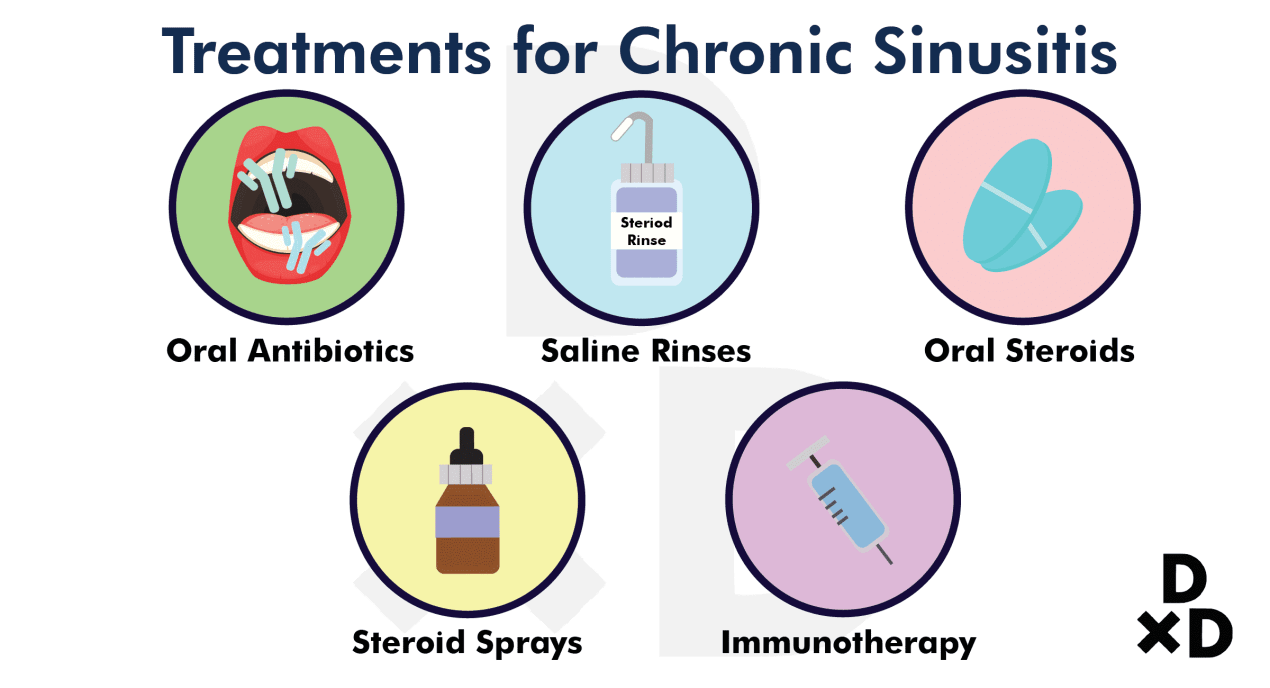
The treatment of chronic sinusitis can indeed be tricky. It may involve prolonged courses of different kinds of treatment methods such as [9]:
- Oral antibiotics
- Saline rinses
- Oral steroids
- Steroid sprays
- Treatment of nasal allergies with immunotherapy, also known as “Allergy Shots’.
The course also includes the correction of the structural deformities of the nose and sinus through surgery as well as improving your immunity levels.
Sinus surgery, also known as FESS or Functional Endoscopic Sinus Surgery, is done through the nose. There are no external cuts on the nose or face that would be made. The aim is to unblock the sinuses as well as remove the mucus.
Besides that, sinus surgery provides a better passage for the saline rinse and steroid solution to run through the sinus cavities. Thus, allowing the sinuses to heal faster.
Although most chronic sinusitis can be treated, there is no permanent cure. In addition, there can always be a small risk of repeated infection. This may be due to uncontrollable risk factors.
Can sinusitis lead to serious complications?
Untreated sinusitis (past 7-10 days) will cause prolonged crippling symptoms that may affect your quality of life and your ability to work or study. If you have asthma or bronchitis, untreated sinusitis can in fact worsen these conditions.
In rare cases, severe untreated sinusitis may lead to orbital cellulitis or orbital abscess [10]. They are known as infections of the eye. It also has the potential to affect the brain. For example, meningitis, brain abscess and sinus cavity clot are types of brain infections that may be caused by untreated sinusitis.
With that said, the local complication of the sinusitis may include the formation of mucoceles (a bag of mucus). It can expand and erode into the surrounding structures. Osteomyelitis, which is a severe infection of the bone of the sinuses, may also occur [10].
When and which doctor should I go to for sinusitis?
When should I go to a doctor?
Generally, you should go to a doctor if you have:
- Cold/flu-like symptoms that have not resolved themselves within 7-10 days or is getting worse on day 3-5 of your illness
- Eye problems (e.g. blurred vision, double visionge, eye pain and swelling)
- Neurological problems (e.g. severe headaches, giddiness, drowsiness, neck stiffness, sensitivity to light)
- Any concerns. It is always better to be safe than sorry.
Which doctor should I go to?
Most sinusitis cases can be managed by a General Practitioner. But, you should see an ENT specialist if you have:
- Failed a course of oral antibiotics
- Symptoms lasting longer than 3 months
- Developed any symptoms that may suggest a complicated sinusitis
You may also want to consider looking for a Rhinologist if you have:
- A complex sinus condition such as nasal polyps
- Complicated sinusitis
- Previous failed sinus surgery
- Complex sinus anatomy
Sinusitis: In short
Sinusitis is the infection or inflammation of the sinuses. It can be caused by many factors like genetics, immunity or nasal allergies. Its symptoms are much like other illnesses such as the common cold and rhinitis.
Acute sinusitis tends to last for less than three months whereas chronic sinusitis can last for more than three months.
Above all, if you have sinusitis that has not been resolved within three months, you should visit an ENT. Untreated sinusitis could cause serious, life-threatening complications to the eyes and brain.
GET TREATMENT QUOTE FOR SINUSITIS
Dr Gan Eng Cern is a Consultant Ear, Nose & Throat (ENT) Surgeon with interests ranging across various ENT conditions covering nose problems, sinuses, snoring and Obstructive Sleep Apnoea (OSA).
Read more of Dr Eng Cern Gan's QnA here.




